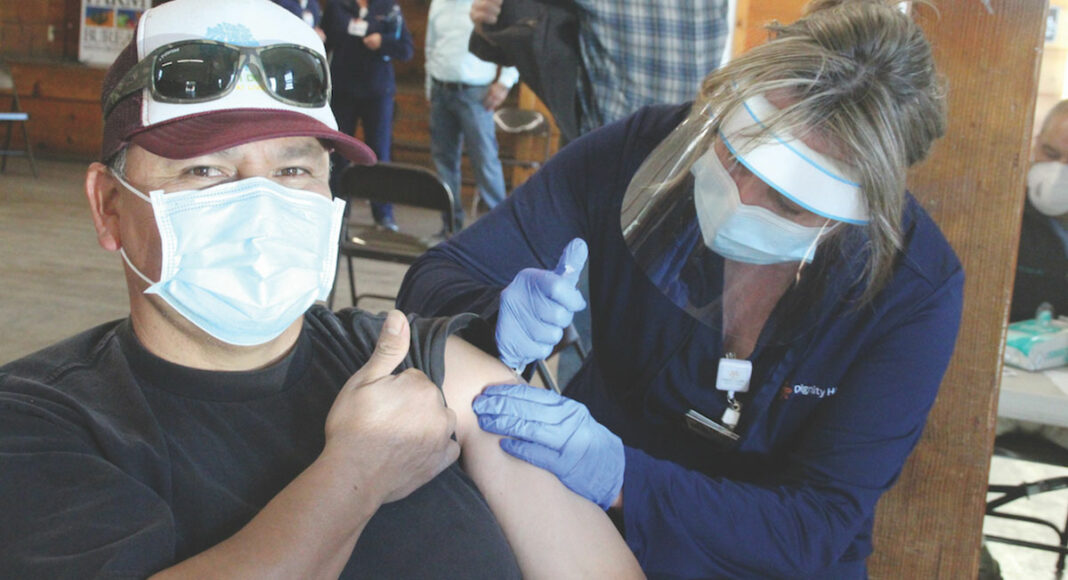Masks, capacity limits and several other mandates imposed by the state to slow the spread of Covid-19 will all become a thing of the past on Tuesday.
And while Santa Cruz County health officials in their first press conference since May called the move a “turning point” in the fight against the virus, they also cautioned that the decision did not mean that the pandemic is over.
“I wish that after 18 months we were at a place where we could say the pandemic was over, and it is not over,” said County Health Services Agency Director Mimi Hall. “What we’ve done is we’ve dampened it.”
Local County Health Officer Dr. Gail Newel on Monday celebrated the milestone of the state ditching its color-coded tiered reopening system by thanking the community for its work in slowing the spread of the virus. But she also raised concerns about slowing vaccination rates, particularly among young adults in the southern reaches of the county.
Between 60-70% of people 39 years old and younger in South County have not yet received a shot, Deputy County Health Officer Dr. David Ghilarducci said. That’s compared to 50% of all county residents in that same age group.
Although county hospitals have seen a large drop in patients infected with Covid-19 as the region inches toward herd immunity, an unvaccinated county resident died of the disease over the weekend. That death raised the county’s death toll to 207.
“What’s happening now is we really have two worlds we’re living in,” Ghilarducci said. “We have the world of those who are vaccinated, who are protected and can take their masks off and really start to live their lives in a normal way, and then we have those who haven’t been able to get vaccinated yet for whatever reason.”
Overall, 73.5% of eligible residents have received at least one dose, and 60% are fully vaccinated. But Ghilarducci said the county’s vaccination rates have also slowed from a peak of 3,200 doses per day over a seven-day period in April to about 912.
Ghilarducci said that slowdown was expected, and Hall added that reaching those who have not yet been vaccinated might possibly be the toughest task of the pandemic.
“Unvaccinated people aren’t spread randomly,” Hall said. “They’re spread in geographic, social and cultural clusters, and because of that they create spaces of vulnerability. We know that even though most of our population is protected, we’re going to continue … the focus on equity, the focus on justice.”
Reaching South County
The county and various health care and service providers in the Watsonville area have started moving away from mass vaccination centers over the past two months—the center at the county fairgrounds, for example, closed in May after helping roughly 20,000 residents receive their vaccine—and shifted to “pop-up” vaccine stations in an effort to try to meet people where they are.
That includes setting up at the Sunday flea market at the fairgrounds where Chief of Public Health Jen Herrera says they are vaccinating roughly 40 people every week. Along with distributing vaccinations, Herrera says the county’s booth also serves as an informal hub of information for residents with questions about the safety and efficacy of the vaccine.
“From that perspective, it’s been very successful,” Herrera said. “It’s been a way to engage with the community and answer their questions about vaccines, especially in South County where we’re hearing a lot of misinformation and lies around vaccine efficacy and safety.”
Hall said that the county has also started working with employers to offer vaccine pop-ups at workplaces.
In addition, the mass vaccination center at the Old City Hall in downtown Watsonville operated by OptumServe is expected to remain open until October, and is taking walk-in appointments. The Covid-19 testing site at Ramsay Park, also run by OptumServe, will also continue to operate until the fall.
Beyond the mask
On a jaunt around the county over the weekend, Newel said she saw several businesses that had outdated health orders posted on their windows. And moments before Monday’s press conference, California Gov. Gavin Newsom made an announcement about workplace masking mandates, saying that he would sign an executive order on Thursday if Cal/OSHA passes updated guidelines that would allow fully vaccinated people to go without a mask in the workplace.
Until then, all employers must continue requiring employees to wear their masks.
Newel said she worried conflicting messaging overlapping from various rewrites and revisions over the past year would continue to create confusion among the masses come Tuesday.
But she said that starting Tuesday, fully vaccinated people can leave their masks at home in most cases, and that according to the state’s Beyond the Blueprint rules masks would only be required in the following places:
- Health care facilities
- Homeless and emergency shelters
- Public transportation hubs and in public transportation
- Detention facilities
- Schools and other similar settings
- Workplaces
In all other cases, including indoors, masks will no longer be required by the state. But, Newel added, businesses can continue to require masks if they choose. They can also choose to have customers show proof of vaccination before entering, or have them self-attest that they are vaccinated.
“We’re asking everyone to please respect local businesses that choose to continue taking these additional measures, including asking for vaccination status or requiring masks,” she said. “It’s their choice to do so.”
To schedule a vaccination, visit santacruzhealth.org/coronavirusvaccine.













